Share this post!

Essential oils have been around for centuries, offering a natural and holistic approach to health and well-being. Derived from plants, these oils are rich in antioxidants, antimicrobial, and anti-inflammatory properties. They have been used traditionally for medicinal, cosmetic, and even spiritual purposes.
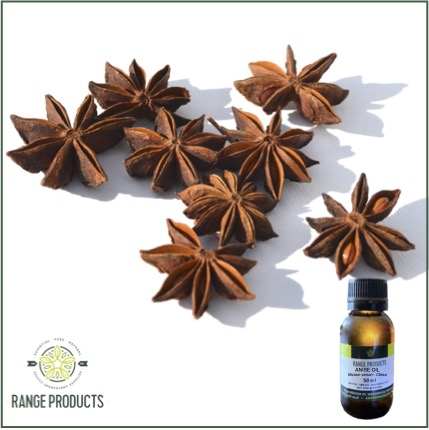
Anise star essential oil has analgesic, anti-epileptic, anti-hysteric, anti-rheumatic, anti-septic, anti-spasmodic, carminative, cordial, decongestant, digestive, expectorant, insecticide, sedative, stimulant and vermifuge properties. The main chemical constituents are anethole, methylchavicol and linalool.
- Digestion: Relieves gas, bloating, indigestion
- Respiratory System: Expectorant action helps clear congestion
- Nervous System: Has a calming, sedative effect
- Oral Health: Freshens breath and relieves toothache
Sweet basil essential oil has antidepressant, antiseptic, antiviral, bactericidal, carminative, cordial, digestive, diuretic, emmenagogue, expectorant, febrifuge, insecticide, stomachic and tonic properties. The main chemical components are linalool, eugenol, and methyl chavicol.
- Respiratory System: Relieves coughs, colds, sinusitis
- Nervous System: Reduces depression, mental fatigue
- Skin Care: Treats cuts, wounds, bacterial infections
- Circulation: Helps lower blood pressure
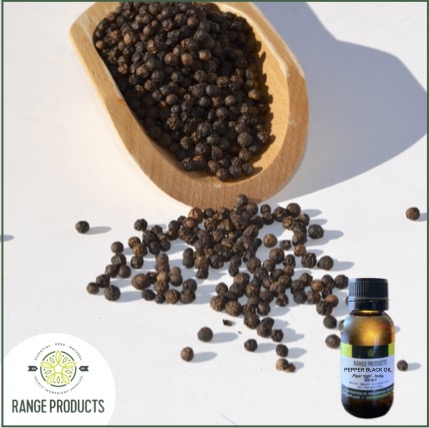
Black pepper essential oil has analgesic, antimicrobial, antioxidant, antirheumatic, antiseptic, bactericidal, carminative, circulatory stimulant, diaphoretic, digestive, febrifuge, laxative, rubefacient and tonic properties. The main chemical constituents are limonene, pinene, piperine and sabinene.
- Circulation: Improves circulation and low energy
- Pain Relief: Reduces muscle/joint aches and pains
- Digestion: Increases secretion of digestive juices
- Immune System: Protects against viral infections
- Cautions: Can irritate skin - dilute before topical use
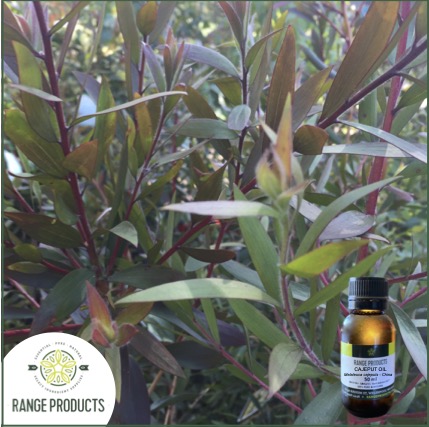
Cajeput essential oil has antimicrobial, antiviral, expectorant, and insecticidal properties. The main chemical constituents are cineol, terpineol, and cymene.
- Respiratory System: Relieves congestion, coughs, bronchitis
- Skin Care: Treats acne, oily skin, skin spots, insect bites
- Pain Relief: Eases muscular aches, nerve pain, arthritis
Calamus essential oil has antibacterial, anti-inflammatory, antispasmodic, carminative, and nervine properties. The main chemical components are beta-asarone, alpha-asarone, and shyobunone.
- Digestive System: Relieves bloating, gas, stomach cramps
- Circulation: Promotes circulation to the brain and nervous system
- Nervous System: Stimulates memory and concentration
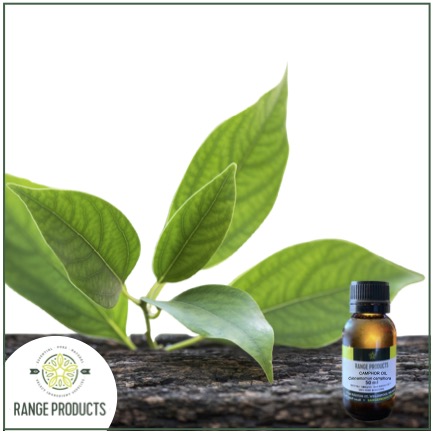
Camphor essential oil has anti-inflammatory, antispasmodic, antiviral, decongestant, and stimulant properties. The main chemical constituent is camphor.
- Respiratory System: Relieves congestion, coughs, bronchitis
- Pain Relief: Reduces arthritis, muscle/joint aches, sprains
- Skin Care: Treats acne, eczema, itching, fungal infections
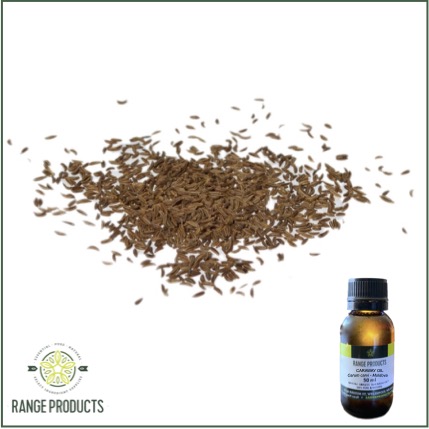
Caraway essential oil has antihistaminic, antiseptic, antispasmodic, astringent, expectorant and stimulating properties. The main chemical components are limonene, carvone, and carvene.
- Digestive System: Settles indigestion, cramps, flatulence
- Respiratory System: Clears congestion, relieves coughs
- Skin Care: Improves complexion, minimizes wrinkles
- Immune System: Boosts defenses against allergies, colds
Cardamom essential oil has antiseptic, carminative, cephalic, cordial, and stomachic properties. The main chemical constituents are cineol, nerolidol, and limonene.
- Digestive System: Helps relieve indigestion, flatulence, nausea
- Respiratory System: Eases coughs, chest congestion
- Nervous System: Stimulates alertness and concentration
- Circulation: Helps boost poor circulation, low blood pressure
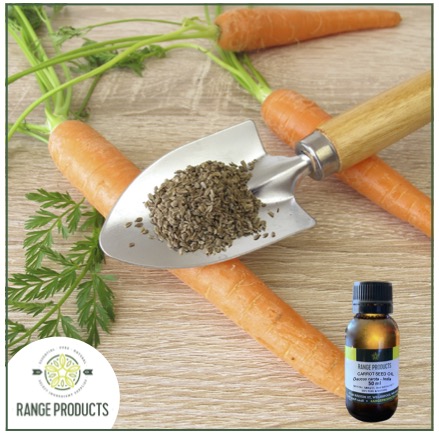
Carrot seed essential oil has antiseptic, carminative, cytophylactic, emmenagogue, and hepatoprotective properties. The main chemical components are carotol, daucol, and geranyl acetate.
- Skin Care: Tones and revitalizes aged/mature skin
- Detoxification: Supports liver health and hormone regulation
- Women's Health: Can help stimulate menstrual flow
- Cautions: Avoid use during pregnancy and breastfeeding.
Catnip essential oil has anti-inflammatory, antispasmodic, astringent, nervine, sedative, and stomachic properties. The main chemical constituents are nepetalactone, geraniol, and citronellol.
- Nervous System: Reduces stress, anxiety, nervous tension
- Sleep: Promotes relaxation and restful sleep
- Digestive System: Settles stomach and intestinal cramps
- Skin Care: Helps heal skin irritations and rashes
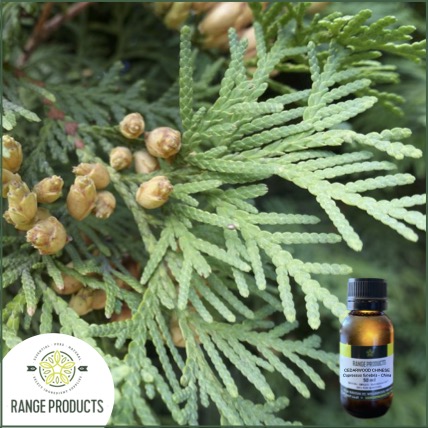
Virginian cedarwood essential oil has antifungal, anti-inflammatory, antiseborrheic, antiseptic, and astringent properties. The main chemical components are cedrol, widdrol, and thujopsene.
- Skin Care: Helps treat acne, eczema, dandruff, oily skin
- Respiratory System: Relieves coughs, congestion, bronchitis
- Pain Relief: Reduces arthritis and rheumatism
- Nervous System: Has calming, uplifting qualities
- Other: Natural insect repellent
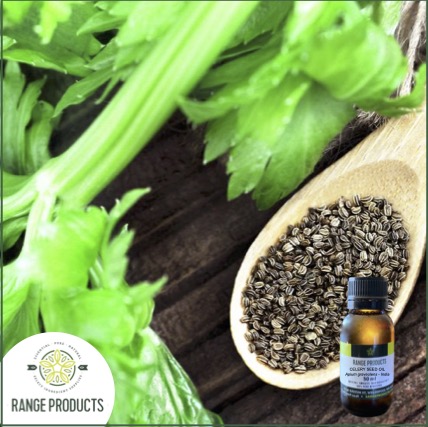
Celery seed essential oil has antimicrobial, antioxidant, diuretic, enervating, hypotensive, and stimulant properties. The main chemical constituents are limonene, selinene, and sedanolide.
- Detoxification: Supports kidney and liver health
- Digestive System: Relieves intestinal and digestive issues
- Women's Health: Can help stimulate menstrual flow
- Pain Relief: Eases gout, arthritis, neuralgia, sciatica
- Cautions: Avoid use during pregnancy.
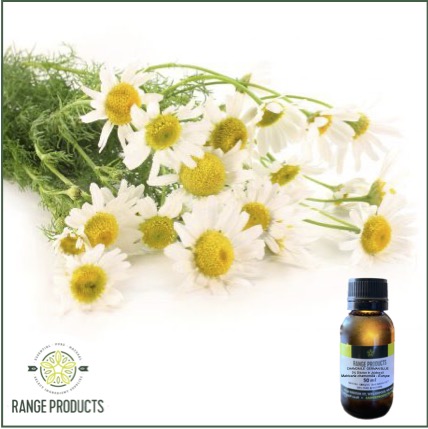
German chamomile essential oil has anti-inflammatory, antispasmodic, and sedative properties. The main chemical components are bisabolol, farnesene, and chamazulene.
- Skin Care: Soothes irritations like acne, rashes, wounds
- Women's Health: Relieves PMS and menstrual cramps
- Digestive System: Settles nausea, colic, indigestion
- Nervous System: Eases anxiety, headache, insomnia
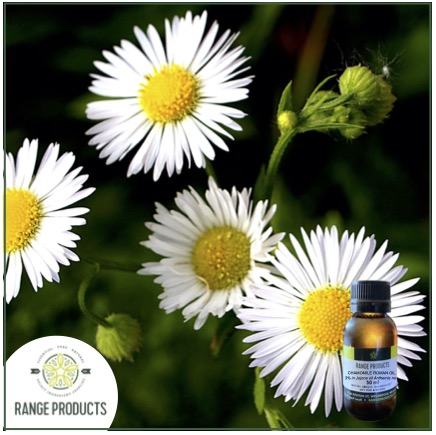
Roman chamomile essential oil has anti-inflammatory, antineuralgic, antiseptic, antispasmodic, and bactericidal properties. The main chemical constituents are isobutyl angelate, and methyl acrylate.
- Skin Care: Soothes acne, rashes, cuts, burns, eczema
- Digestive System: Settles nausea, colic, indigestion
- Women's Health: Relieves painful menstruation
- Nervous System: Reduces anxiety, headache, stress
Champaca essential oil has aphrodisiac, antidepressant, anti-inflammatory, antiseptic, and astringent properties. The main chemical components are linalool, geraniol, and caryophyllene oxide.
- Skin Care: Helps heal cuts, wounds, irritations, scars
- Nervous System: Uplifts mood, reduces anxiety and stress
- Respiratory System: Relieves coughs, colds, congestion
- Women's Health: Regulates hormones, relieves PMS/menopause
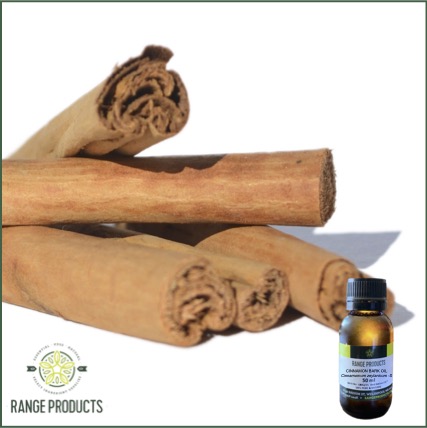
Cinnamon bark essential oil has analgesic, antioxidant, antiseptic, and circulatory stimulant properties. The main chemical constituents are cinnamaldehyde, eugenol, and linalool.
- Circulation: Warms the body, boosts circulation
- Immune System: Boosts immunity, protects from infections
- Digestive System: Settles cramps, diarrhea, nausea
- Skin Care: Helps treat fungal infections, warts
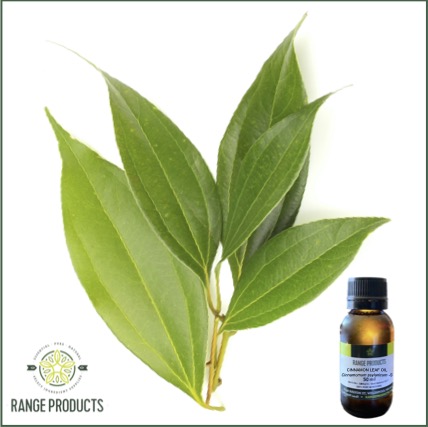
Cinnamon leaf essential oil has analgesic, antimicrobial, and antioxidant properties similar to cinnamon bark oil but is less irritating topically. Main chemical components are eugenol, linalool, and cinnamaldehyde.
- Skin Care: Helps treat infections, warts, fungal issues
- Women's Health: May help stimulate menstruation
- Immune System: Boosts immunity, protects from infection
- Cautions: Less irritating than bark oil but still requires dilution/caution.
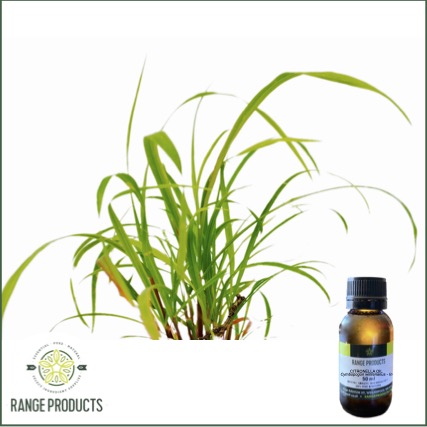
Citronella essential oil has antifungal, anti-inflammatory, antiseptic, bactericidal, deodorant, diaphoretic, and insecticidal properties. The main chemical components are geraniol, citronellol, and citronellal.
- Skin Care: Clears oily skin and dandruff
- Pain Relief: Eases headaches, muscle/joint pain
- Immune System: Protects against infections
- Other: Natural insect repellent
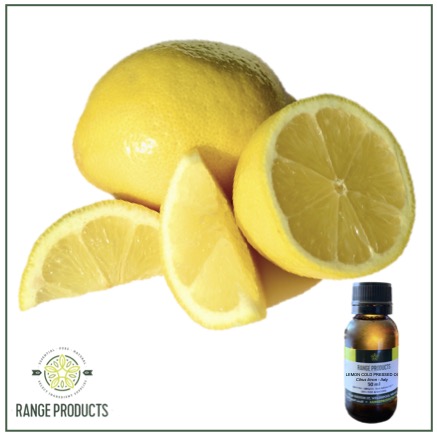
Citrus mix essential oil blends have uplifting, rejuvenating, and stress-relieving properties. Main chemical components are limonene, myrcene, linalool, citronellal, and geraniol.
- Skin Care: Helps treat dull, congested, oily complexions
- Nervous System: Reduces anxiety, depression, stress
- Immune System: Boosts immunity against infections
- Circulation: Improves sluggish circulation
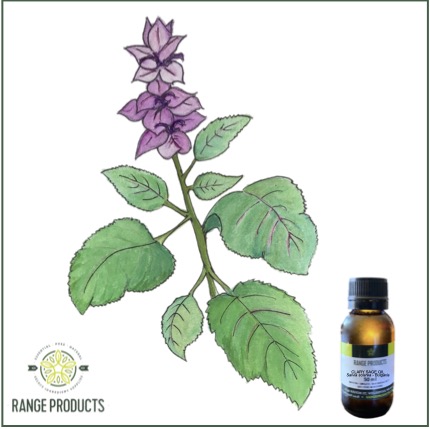
Clary sage essential oil has antidepressant, anticonvulsive, anti-inflammatory, antiseptic, antispasmodic, and bactericidal properties. The main chemical constituents are linalyl acetate, linalool, and caryophyllene.
- Women's Health: Relieves PMS, cramps, menopause issues
- Circulation: Helps regulate rapid breathing, heartbeat
- Skin Care: Regulates oil production, soothes rashes
- Nervous System: Eases anxiety, depression, stress
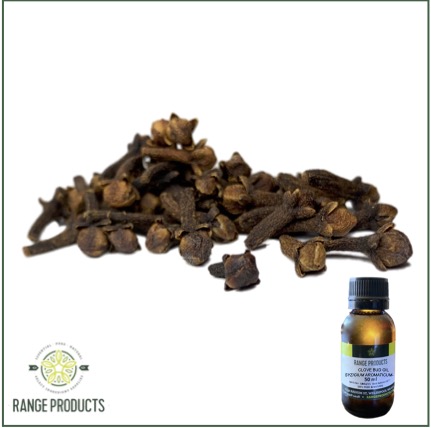
Clove bud essential oil has analgesic, antibacterial, antioxidant, antiseptic, antitussive, antiviral, and stimulant properties. The main chemical components are eugenol, eugenyl acetate, and caryophyllene.
- Oral Care: Alleviates toothaches, gum disease
- Immune System: Boosts immunity, protects against infection
- Pain Relief: Reduces headaches, arthritis, muscle aches
- Skin Care: Treats acne, cuts, sores, warts, athletes foot
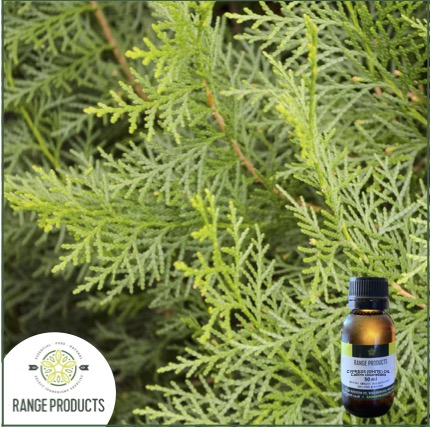
Cypress essential oil has antiseborrheic, antiseptic, astringent, deodorant, decongestant, and venous decongestant properties. The main chemical constituents are alpha-pinene, delta-3-carene, and limonene.
- Circulation: Reduces varicose veins, edema, hemorrhoids
- Respiratory System: Relieves coughs, colds, bronchitis, asthma
- Skin Care: Tones and tightens skin, minimizes pores
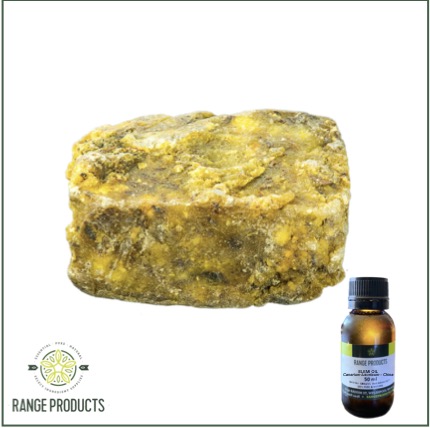
Elemi essential oil has antiseptic, balsamic, expectorant, and stimulating properties. The main chemical components are limonene, elemol, and cadinene.
- Skin Care: Heals mature, sagging skin and wrinkles
- Respiratory System: Relieves coughs, congestion, bronchitis
- Pain Relief: Eases aches, arthritis, muscle spasms
- Nervous System: Uplifts mood, reduces nervous exhaustion
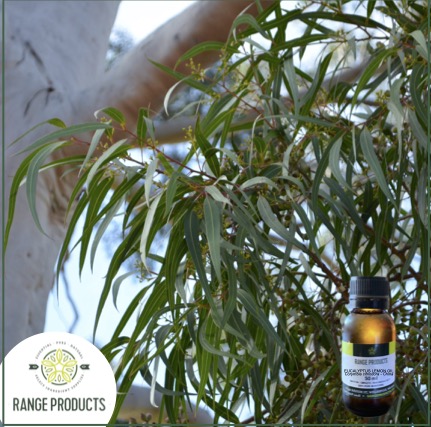
Eucalyptus citriodora essential oil has anti-inflammatory, antibacterial, antiviral, and invigorating properties. The main chemical constituents are citronellal, citronellol, and isopulegol.
- Immune System: Protects against colds, flu, infections
- Respiratory System: Eases asthma, coughs, sore throat
- Skin Care: Helps heal fungal infections, acne, chickenpox
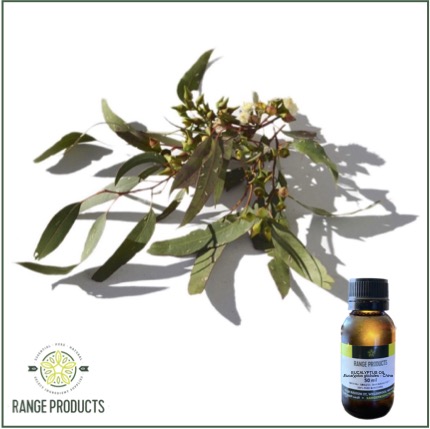
Eucalyptus globulus essential oil has analgesic, anti-inflammatory, antibacterial, antiviral, and decongestant properties. The main chemical constituent is eucalyptol (80-85%).
- Respiratory System: Relieves congestion, coughs, asthma
- Immune System: Protects against infections
- Pain Relief: Eases muscular aches and pains
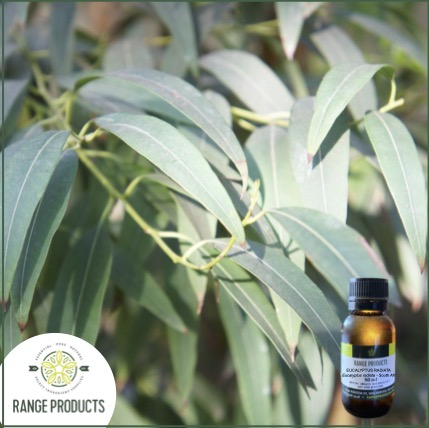
Eucalyptus radiata essential oil has analgesic, antibacterial, antiviral, and decongestant properties. The main chemical constituents are eucalyptol, limonene, and alpha-terpineol.
- Respiratory System: Relieves asthma, bronchitis, sinusitis
- Immune System: Protects against viral infections
- Pain Relief: Eases muscle aches, cramps, rheumatic pain
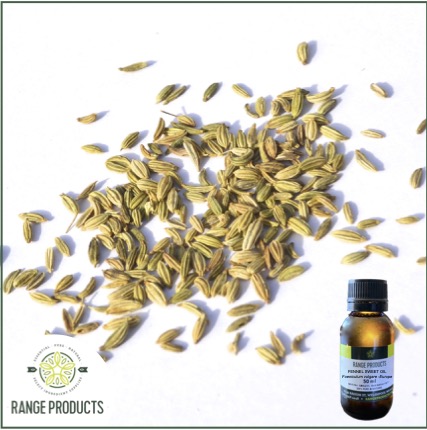
Sweet fennel essential oil has carminative, depurative, diuretic, galactogogue, splenic, and vermifuge properties. The main chemical components are anethole, fenchone, and estragole.
- Digestion: Improves digestion, relieves gas and bloating
- Respiratory System: Expectorant action helps clear mucus
- Women's Health: Can help promote milk production
- Cautions: Avoid use during pregnancy. May inhibit blood clotting.
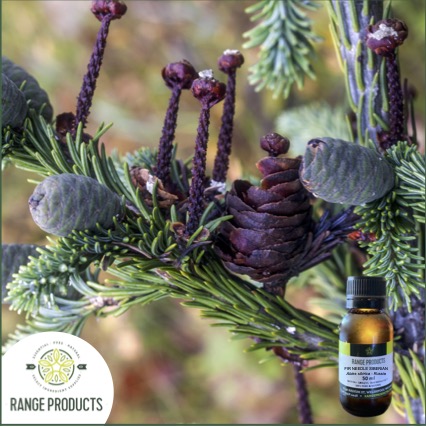
Fir needle essential oil has anti-inflammatory, analgesic, antimicrobial, and sedative properties. The main chemical constituents are bornyl acetate, pinene, and limonene.
- Pain Relief: Reduces muscle/joint pain, sprains, strains
- Respiratory System: Alleviates coughs, colds, congestion
- Immune System: Boosts immunity against infections
- Nervous System: Promotes relaxation and calming
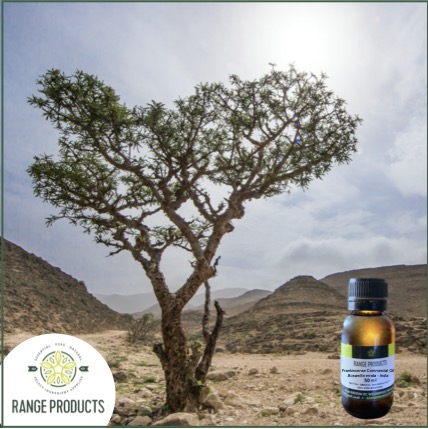
Frankincense essential oil has anti-inflammatory, antiseptic, astringent, carminative, cicatrisant, cytophylactic, and vulnerary properties. The main chemical constituents are alpha-pinene, limonene, and beta-caryophyllene.
- Skin Care: Helps rejuvenate mature skin and heal wounds
- Pain Relief: Reduces arthritis, muscle/joint pain, rheumatism
- Immune System: Boosts immune function and protection
- Respiratory System: Relieves asthma, bronchitis, coughs
- Nervous System: Reduces anxiety and stress
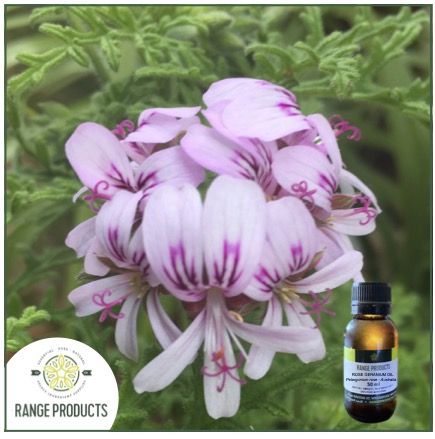
Geranium essential oil has antihemorrhagic, anti-inflammatory, antiseptic, astringent, cicatrisant, diuretic, styptic, tonic, and vermifuge properties. The main chemical components are citronellol, geraniol, and linalool.
- Skin Care: Helps heal wounds, rashes, eczema, acne
- Women's Health: Relieves PMS symptoms and menopause issues
- Emotional Health: Uplifts mood, reduces stress and anxiety
- Pain Relief: Reduces inflammation, arthritis, muscle pain
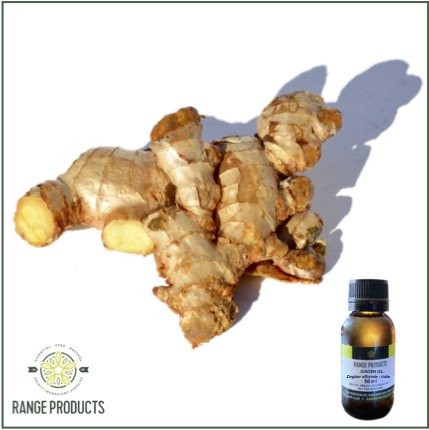
Ginger essential oil has analgesic, anti-inflammatory, antioxidant, and carminative properties. The main chemical constituents are zingiberene, curcumene, and farnesene.
- Digestive System: Settles nausea, diarrhea, cramps, bloating
- Circulation: Warms the body, improves blood flow
- Pain Relief: Eases arthritis, muscle and joint pain
- Immune System: Protects against infections and colds
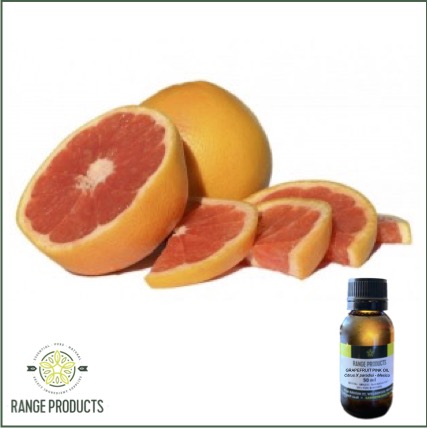
Pink grapefruit essential oil has antioxidant, diuretic, lymphatic stimulant, and tonic properties. The main chemical components are limonene, myrcene, and geraniol.
- Circulation: Improves fluid retention, edema, cellulite
- Immune System: Boosts defenses against infections
- Skin Care: Improves acne, congestion, dull complexions
- Nervous System: Uplifts mood and reduces stress
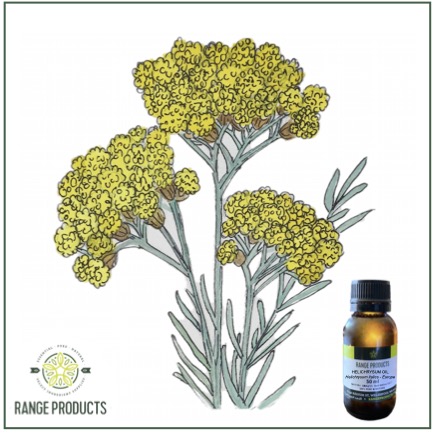
Helichrysum essential oil has anti-inflammatory, antispasmodic, antiviral, cicatrisant, and expectorant properties. The main chemical components are neryl acetate, gamma-curcumene, and italidione.
- Skin Care: Heals wounds, scars, burns, rashes
- Respiratory System: Thins mucus, relieves coughs
- Circulation: Reduces swelling, fluid retention
- Nervous System: Eases stress and nervous exhaustion
Ho wood essential oil has anti-infectious, antiviral, antibacterial, and sedative properties. The main chemical constituents are linalool, limonene, and terpineol.
- Immune System: Protects against viral infections
- Respiratory System: Relieves congestion, coughs, colds
- Nervous System: Promotes relaxation and sleep
- Skin Care: Helps heal acne, rashes, blisters
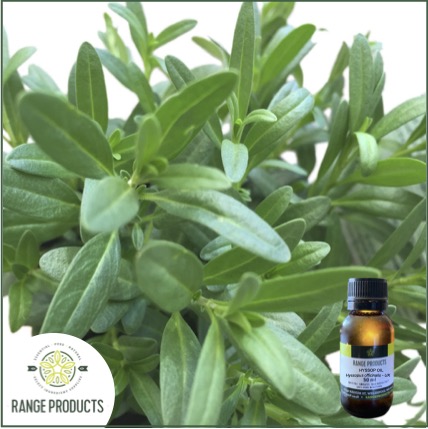
Hyssop essential oil has anti-rheumatic, antispasmodic, astringent, carminative, cicatrizant, diaphoretic, digestive, diuretic, emenagogue, expectorant, hypertensive, nervine, sedative, stimulant, stomachic, and tonic properties. The main chemical components are pinocamphone, isopinocamphone, and limonene.
- Respiratory System: Relieves congestion, coughs, asthma
- Circulatory System: Improves blood flow, reduces gout, edema
- Digestive System: Stimulates digestion and appetite
- Skin Care: Helps heal bruises, cuts, dermatitis
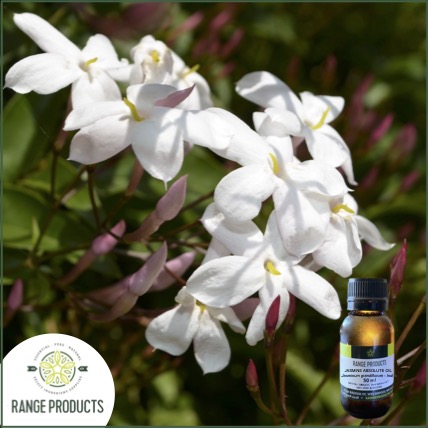
Jasmine absolute essential oil has anti-depressant, anti-inflammatory, antiseptic, antispasmodic, aphrodisiac, cicatrizant, expectorant, and sedative properties. The main chemical components are benzyl acetate, linalool, and benzyl alcohol.
- Emotional Health: Uplifts mood, relieves depression
- Skin Care: Helps treat dry, irritated, sensitive skin
- Respiratory System: Relieves spasmodic coughs
- Nervous System: Reduces anxiety, stress, and tension
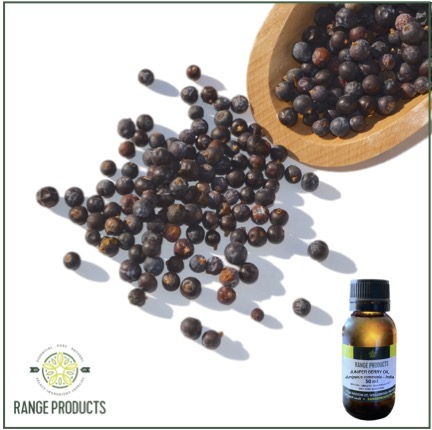
Juniper berry essential oil has antiseptic, antirheumatic, antispasmodic, astringent, carminative, depurative, diuretic, rubefacient, stomachic, and tonic properties. The main chemical components are alpha-pinene, camphene, and myrcene.
- Detoxification: Supports kidney/urinary function
- Skin Care: Helps clear acne, dermatitis, oily skin
- Pain Relief: Eases rheumatism, arthritis, gout, muscle pain
- Digestive System: Settles indigestion, cramps, bloating
Kanuka essential oil has anti-fungal, anti-inflammatory, antiseptic, and pain-relieving properties. The main chemical constituents are alpha-pinene, limonene, and germacrene.
- Skin Care: Helps treat acne, fungal infections
- Pain Relief: Reduces muscle aches, arthritis, gout
- Respiratory System: Relieves congestion, coughs, colds
- Oral Health: Alleviates mouth ulcers and toothaches
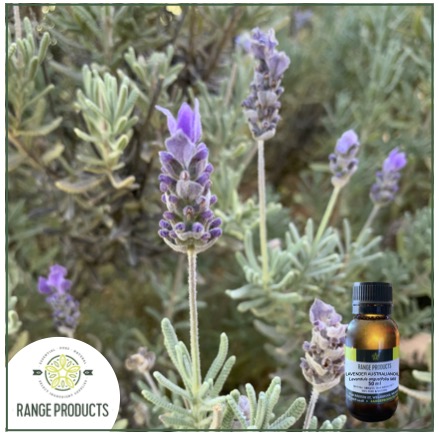
Lavender essential oil has analgesic, anti-inflammatory, antiseptic, antitussive, anti-anxiety, antibacterial, antimicrobial, antifungal, antispasmodic, and sedative properties. The main chemical constituents are linalool and linalyl acetate.
- Skin Care: Helps heal burns, cuts, stings, acne, eczema
- Headaches: Provides relief for migraines and tension headaches
- Sleep: Promotes relaxation and restful sleep
- Stress: Reduces anxiety, nervous tension and emotional exhaustion

Lemon essential oil has anti-anemic, antidepressant, antiseptic, antispasmodic, bactericidal, carminative, cicatrizant, febrifuge, haemostatic, and tonic properties. The main chemical components are limonene, beta-pinene, and gamma-terpinene.
- Skin Care: Brightens dull, oily complexions
- Immune System: Protects against colds, flu and infections
- Nervous System: Improves mood and reduces anxiety/stress
- Oral Health: Freshens breath and alleviates toothaches
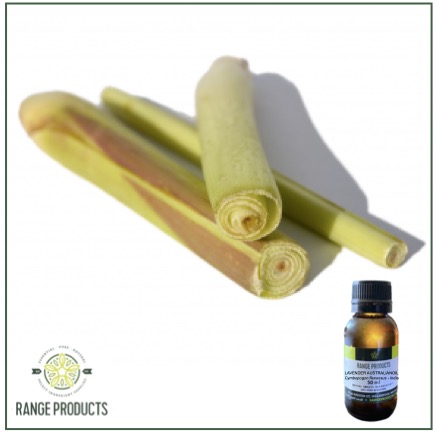
Lemongrass essential oil has analgesic, antidepressant, antimicrobial, antipyretic, antiseptic, astringent, bactericidal, carminative, deodorant, diuretic, febrifuge, fungicidal, galactogogue, insecticidal, nervine, sedative, and tonic properties. The main chemical components are geranyl acetate, myrcene, and citronellal.
- Pain Relief: Reduces headaches, muscle pain, arthritis
- Digestion: Settles stomach issues like nausea, cramps, diarrhea
- Skin Care: Clears acne, oily skin and insect bites
- Immune System: Protects against colds, flu and infections
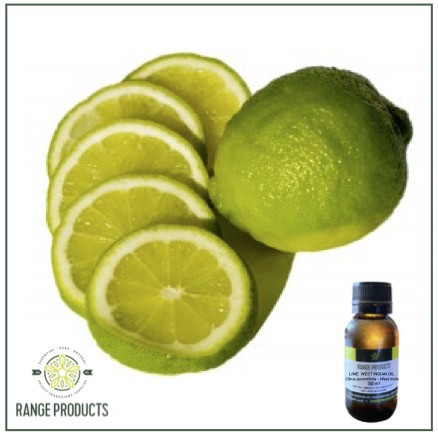
Lime essential oil has antiseptic, antiviral, astringent, bactericidal, disinfectant, febrifuge, hemostatic, and restorative properties. The main chemical components are limonene, beta-pinene, and gamma-terpinene.
- Immune System: Protects against viral infections
- Digestion: Settles indigestion, nausea, diarrhea
- Oral Health: Alleviates toothaches and gum issues
- Skin Care: Improves skin tone, clears acne, scars
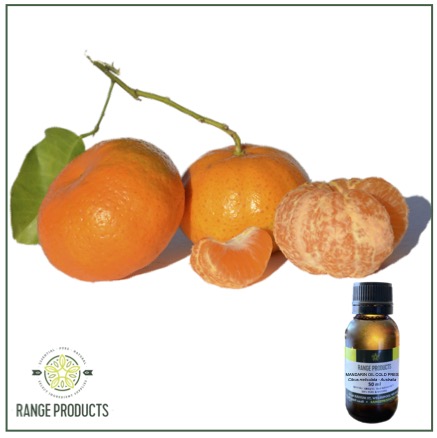
Mandarin essential oil has antiseptic, antispasmodic, circulatory, cytophylactic, depurative, digestive, hepatic, nervous relaxant, sedative, stomachic and tonic properties. The main chemical components are limonene, gamma-terpinolene, and geranial.
- Digestion: Improves digestion, relieves gas, nausea
- Circulation: Improves blood flow and reduces fluid retention
- Nervous System: Relieves insomnia, anxiety, nervousness
- Skin Care: Helps reduce stretch marks, scars, acne
Manuka essential oil has analgesic, anti-dandruff, antibiotic, anti-fungal, anti-inflammatory, antiseptic, antiviral, cicatrisant, cytophylactic, and vulnerary properties. The main chemical components are leptosperin, calamenene, and caryophyllene.
- Skin Care: Helps treat acne, fungal infections, wounds
- Oral Health: Alleviates toothaches and mouth ulcers
- Respiratory System: Relieves sinusitis, colds, coughs
- Immune System: Boosts immunity against infections
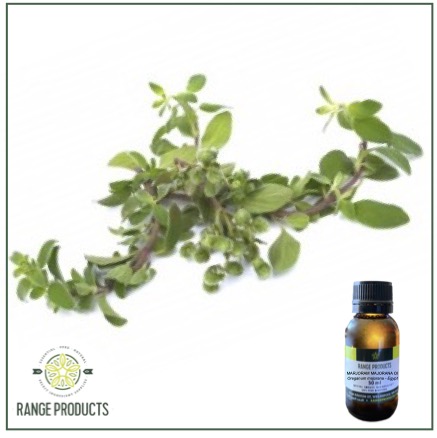
Sweet marjoram essential oil has analgesic, anaphrodisiac, antispasmodic, antiviral, bactericidal, carminative, cordial, diaphoretic, digestive, diuretic, emenagogue, expectorant, fungicidal, laxative, sedative, vasodilator, and vulnerary properties. The main chemical components are sabinene hydrate, terpinen-4-ol, and gamma-terpinene.
- Digestion: Improves digestion, relieves cramps, nausea
- Circulation: Promotes circulation, lowers high blood pressure
- Pain Relief: Reduces headaches, muscle pain, nerve pain
- Immune System: Protects against colds, flu and infections
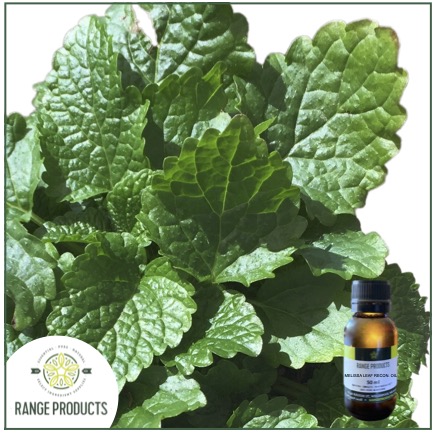
Melissa essential oil has antidepressant, cordial, nervine, emenagogue, sedative, antispasmodic, antibacterial, stomachic, antipyretic, febrifuge, diaphoretic, carminative, and sudorific properties. The main chemical components are citronellal, neral, and geranial.
- Emotional Health: Elevates mood and reduces irritability
- Nervous System: Promotes relaxation and sleep
- Women's Health: Assists with menstrual and menopause symptoms
- Digestion: Settles indigestion, nausea, and stomach cramps
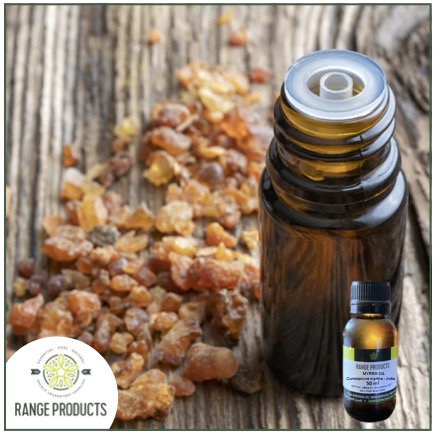
Myrrh essential oil has anti-inflammatory, analgesic, anti-tumoral, anti-fungal, stimulant, carminative, stomachic, antiseptic, astringent, antimicrobial, anti-catarrhal, expectorant, mucolytic, and immune enhancing properties. The main chemical constituents are furanoeudesma-1,3-diene, lindestrene, and curzerene.
- Skin Care: Helps heal chapped, cracked, mature skin
- Oral Health: Reduces mouth and gum infections
- Respiratory System: Relieves coughs, colds, bronchitis
- Immune System: Boosts immunity and protects from infections
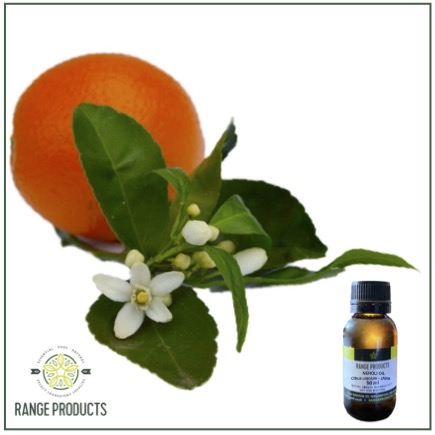
Neroli essential oil has antidepressant, antiseptic, antispasmodic, aphrodisiac, bactericidal, carminative, cordial, deodorant, digestive, emollient, sedative, and tonic properties. The main chemical components are linalool, linalyl acetate, nerolidol, and limonene.
- Skin Care: Regenerates and rejuvenates mature skin
- Emotional Health: Elevates mood, reduces anxiety and stress
- Circulation: Improves blood flow and heart palpitations
- Digestion: Relieves intestinal spasms, colitis, diarrhea
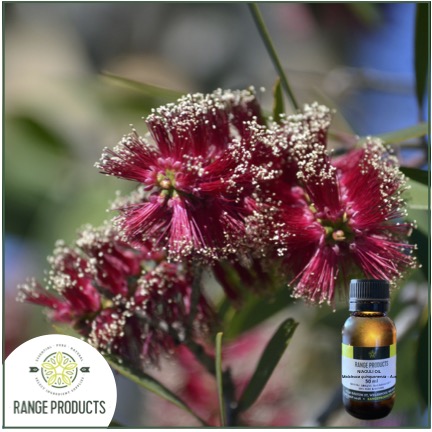
Niaouli essential oil has analgesic, antiseptic, bactericidal, cicatrisant, stimulant, vermifuge, and vulnerary properties. The main chemical constituents are viridiflorol, limonene, and 1,8-cineole.
- Skin Care: Helps heal cuts, wounds, infections, insect bites
- Respiratory System: Relieves coughs, colds, sinusitis, asthma
- Immune System: Boosts immunity against infections
- Pain Relief: Reduces muscular aches and pains
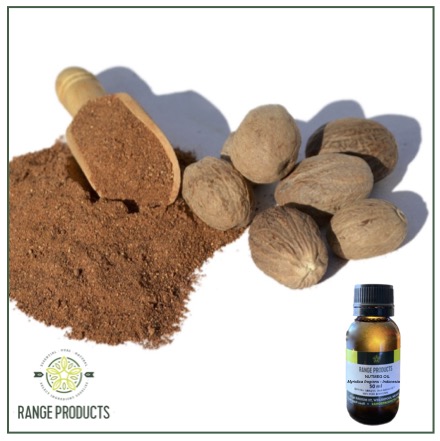
Nutmeg essential oil has analgesic, antioxidant, antiseptic, bactericidal, larvicidal, muscle relaxant, nervine, and stimulant properties. The main chemical components are sabinene, myristicin, and elemicin.
- Circulation: Improves blood flow, reduces edema
- Pain Relief: Eases muscle/joint pain, gout, arthritis
- Digestion: Settles nausea, diarrhea, cramps, bloating
- Skin Care: Helps treat acne, scars, dull complexion
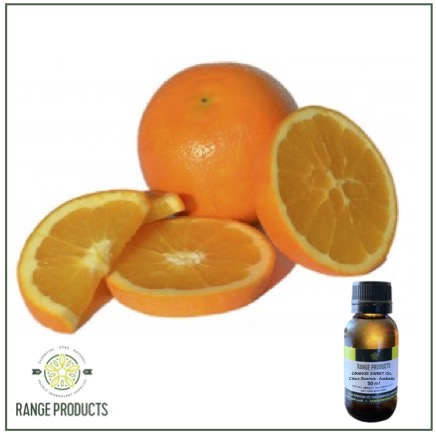
Sweet orange essential oil has anti-inflammatory, antidepressant, antiseptic, antispasmodic, aphrodisiac, carminative, diuretic, tonic, sedative, and cholagogue properties. The main chemical components are limonene, myrcene, and citronellal.
- Immune System: Boosts immunity against colds/flu
- Digestion: Improves digestion, relieves constipation
- Skin Care: Helps treat acne, dull complexion
- Nervous System: Reduces anxiety, insomnia, depression
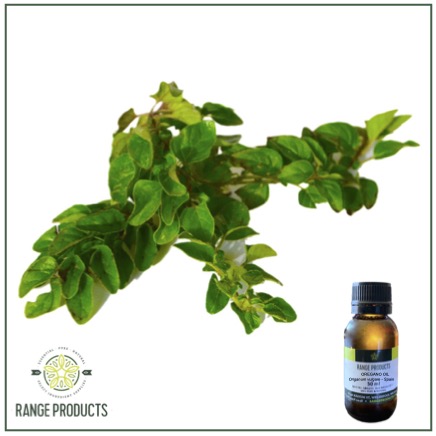
Oregano essential oil has analgesic, anti-inflammatory, antioxidant, antiseptic, antibacterial, antiparasitic, antifungal, antiviral, and immune-stimulant properties. The main chemical components are carvacrol, thymol, and cymene.
- Immune System: Boosts immunity, protects against infections
- Digestive System: Settles digestive issues, diarrhea
- Skin Care: Treats fungal infections, warts, acne, dandruff
- Pain Relief: Reduces muscle aches, arthritis, sore joints
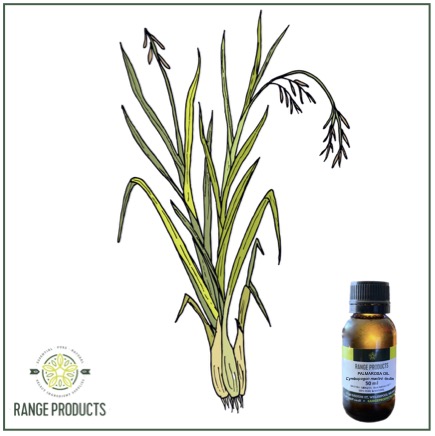
Palmarosa essential oil has antiseptic, bactericidal, cicatrizant, digestive, febrifuge, hydrating, stimulant, and stomachic properties. The main chemical constituents are geraniol, geranyl acetate, dipentene, linalool, and limonene.
- Skin Care: Hydrates, regenerates, heals skin issues
- Digestion: Improves digestion, relieves intestinal infections
- Pain Relief: Reduces fever, headaches, muscle/joint pain
- Emotional Health: Uplifts mood and reduces stress
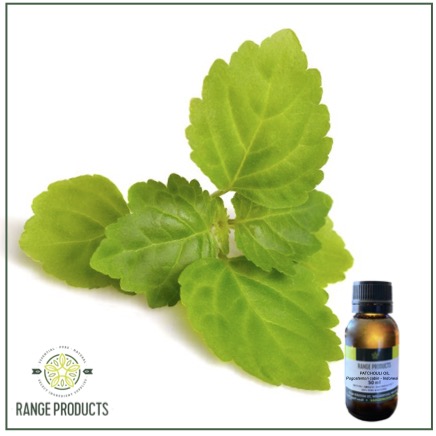
Patchouli essential oil has antidepressant, anti-inflammatory, antiseptic, aphrodisiac, astringent, bactericidal, carminative, cicatrizant, cytophylactic, deodorant, diuretic, febrifuge, fungicide, insecticide, sedative, and tonic properties. The main chemical compounds are patchoulol, bulnesene, caryophyllene, norpatchoulenol, and pogostol.
- Skin Care: Helps treat acne, cracked/chapped skin, wounds
- Emotional Health: Alleviates anxiety, stress, and depression
- Circulation: Improves blood flow and reduces fluid retention
- Pain Relief: Reduces headaches, nausea, muscle/joint pain
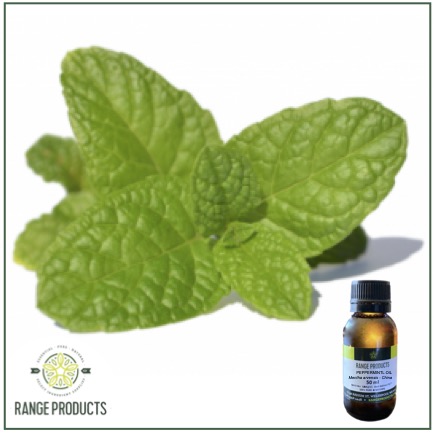
Peppermint essential oil has analgesic, anesthetic, anti-inflammatory, antiseptic, antispasmodic, carminative, cephalic, cordial, decongestant, emenagogue, expectorant, febrifuge, insecticide, stimulant, stomachic and vermifuge properties. The main chemical components are menthol, menthone, and menthyl acetate.
- Digestion: Relieves indigestion, nausea, cramps, diarrhea
- Pain Relief: Alleviates headaches, muscle/joint pain
- Respiratory System: Clears congestion, coughs, sinusitis, asthma
- Nervous System: Improves alertness and concentration
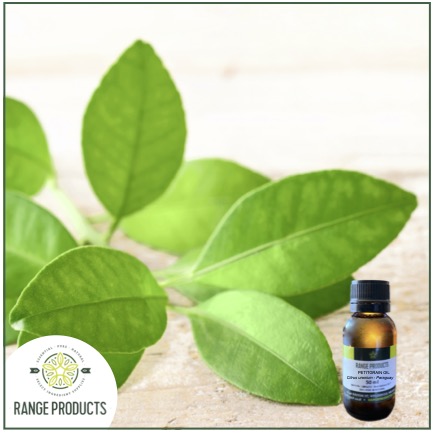
Petitgrain essential oil has antidepressant, antiseptic, antispasmodic, bactericidal, cordial, deodorant, digestive, nervine, sedative, stimulant, stomachic, and tonic properties. The main chemical constituents are linalyl acetate, linalool, myrcene, and ocimene.
- Emotional Health: Reduces stress, anxiety, anger, fatigue
- Skin Care: Helps balance oily complexions and acne
- Circulation: Lowers rapid heartbeat and breathing
- Digestion: Settles cramps, spasms, diarrhea, nausea
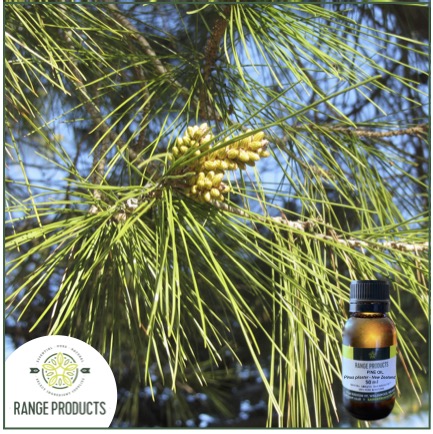
Pine essential oil has analgesic, antibacterial, antibiotic, antioxidant, antiseptic, antiviral, bactericidal, balsamic, cholagogue, deodorant, diuretic, expectorant, hypertensive, restorative, and rubefacient properties. The main chemical components are alpha-pinene, beta-pinene, and limonene.
- Respiratory System: Relieves coughs, colds, congestion
- Pain Relief: Reduces muscle aches, arthritis, rheumatism
- Skin Care: Clears skin of lumps, cuts, insect bites, sores
- Circulation: Improves circulation and reduces hypertension
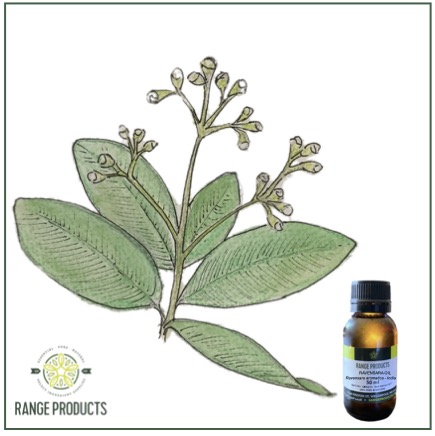
Ravensara essential oil has analgesic, antibacterial, anti-infectious, antidepressant, antifungal, anti-inflammatory, antimicrobial, antiviral, expectorant, and tonic properties. The main chemical components are sabinene, alpha-terpineol, and limonene.
- Respiratory System: Fights colds, flu, bronchitis, sinusitis
- Immune System: Boosts immunity against infections
- Skin Care: Treats cuts, infections, fungal issues, acne
- Nervous System: Uplifts mood, reduces depression

Roman chamomile essential oil has analgesic, anti-inflammatory, antineuralgic, antiseptic, antispasmodic, bactericidal, carminative, digestive, emmenagogue, febrifuge, hepatic, hypnotic, nervine, sedative, stomachic, sudorific, and vermifuge properties. The main chemical constituents are esters of angelic acid and tiglic acid.
- Skin Care: Soothes dermatitis, rashes, acne, wounds
- Pain Relief: Eases headaches, muscle/joint pain
- Digestion: Settles indigestion, nausea, colic, cramps
- Nervous System: Promotes relaxation and sleep
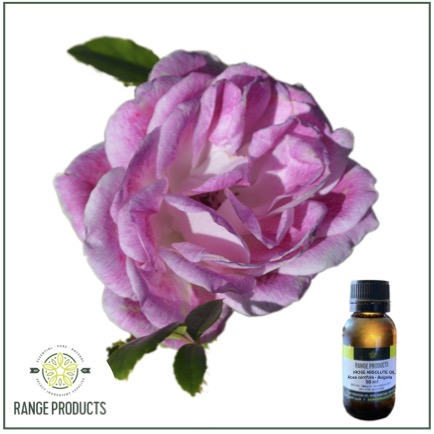
Rose absolute essential oil has analgesic, antidepressant, antiphlogistic, antiseptic, antispasmodic, antiviral, aphrodisiac, astringent, bactericidal, cholagogue, cicatrizant, depurative, emenagogue, hemostatic, hepatic, laxative, and sedative properties. The main chemical compounds are citronellol, citral, carvone, citronellyl acetate, eugenol, ethanol, farnesol, stearoptene, methyl eugenol, nerol, nonanol, nonanal, phenylacetaldehyde, phenylmenthyl acetate, and phenyl geraniol.
- Skin Care: Hydrates, soothes sensitive/dry skin
- Women's Health: Regulates menstruation, relieves cramps
- Emotional Health: Uplifts mood, reduces stress/anxiety
- Circulation: Strengthens capillaries, regulates heartbeat
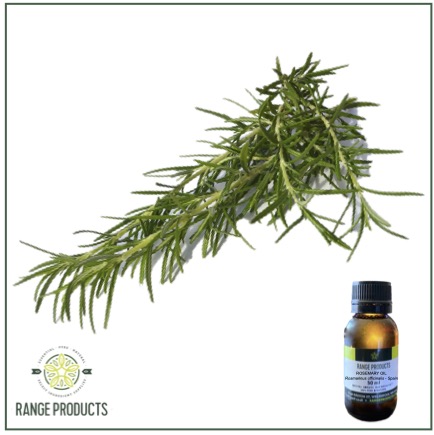
Rosemary essential oil has analgesic, antidepressant, antirheumatic, antiseptic, antispasmodic, astringent, carminative, cephalic, cholagogue, cicatrizant, diuretic, emenagogue, hepatic, hypertensive, nervine, rubefacient, stimulant, and stomachic properties. The main chemical components are a-pinene, borneol, b-pinene, camphor, and 1,8-cineole.
- Circulation: Improves blood circulation and flow
- Pain Relief: Reduces muscle/joint aches, rheumatism
- Memory: Boosts mental clarity and concentration
- Skin Care: Tightens sagging skin and wrinkles
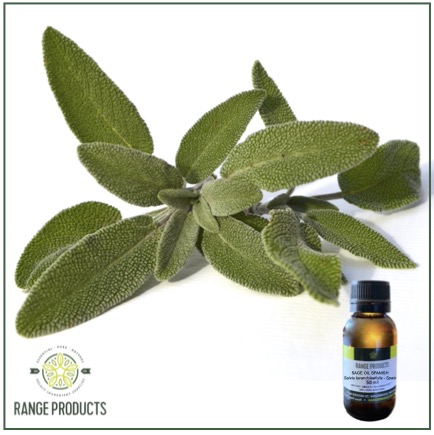
Sage essential oil has antimicrobial, antioxidant, antifungal, anti-inflammatory, antispasmodic, antiseptic, astringent, carminative, cicatrizant, depurative, digestive, disinfectant, emenagogue, expectorant, febrifuge, laxative, and stimulating properties. The main chemical compounds are camphor, 1,8-cineole, and thujone.
- Skin Care: Treats skin infections, rashes, warts
- Circulation: Improves blood flow, lowers cholesterol
- Immune System: Boosts immunity against infections
- Digestion: Relieves bloating, cramps, diarrhea, gas
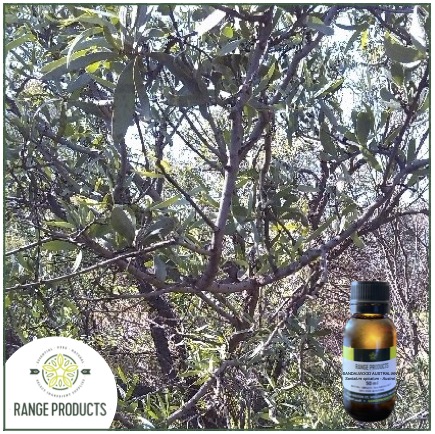
Sandalwood essential oil has antiseptic, antiphlogistic, antispasmodic, aphrodisiac, astringent, bactericidal, carminative, cicatrizant, diuretic, disinfectant, emollient, expectorant, hypotensive, memory booster, sedative, and tonic properties. The main chemical compounds are santalol, santalene, and santalenone.
- Skin Care: Hydrates and soothes dry, cracked skin
- Nervous System: Promotes relaxation and restful sleep
- Emotional Health: Alleviates anxiety, stress and depression
- Respiratory System: Relieves coughs, sore throat, congestion
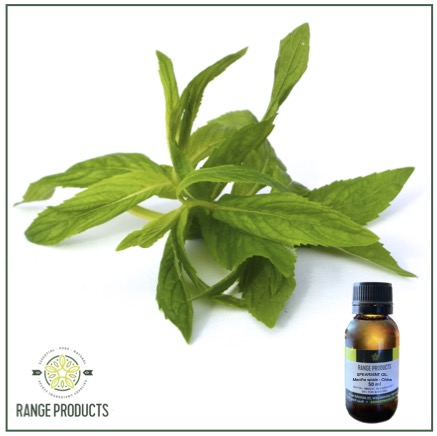
Spearmint essential oil has anesthetic, antiseptic, antispasmodic, carminative, cephalic, emmenagogue, restorative, stimulant, and stomachic properties. The main chemical constituents are limonene, caryophyllene, and myrcene.
- Digestion: Helps relieve nausea, cramps, diarrhea
- Respiratory System: Alleviates coughs, congestion, asthma
- Pain Relief: Reduces headaches, muscle aches, nerve pain
- Oral Health: Freshens breath and supports gum health
Spikenard essential oil has anti-inflammatory, antibacterial, antifungal, anti-oxidant, deodorant, laxative, and sedative properties. The main chemical compounds are jatamansone, nardostachone, valeranal, valeranone, and valerena-3-ol.
- Skin Care: Reduces inflammation, rashes, allergies
- Circulation: Promotes blood flow and heart health
- Sleep: Relieves insomnia and promotes relaxation
- Stress: Alleviates anxiety, nervous tension, stress
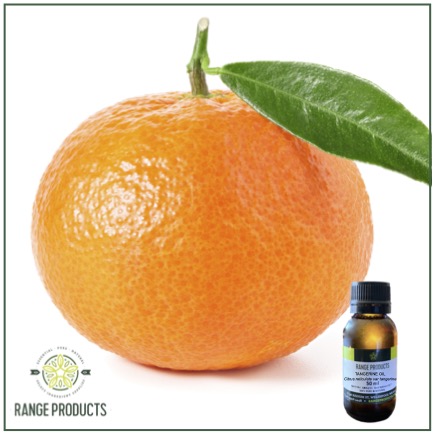
Tangerine essential oil has antiseptic, antispasmodic, cytophylactic, depurative, sedative, stomachic and tonic properties. The main chemical components are limonene, gamma-terpinene, alpha-pinene, and linalool.
- Digestion: Improves digestion, relieves cramps
- Circulation: Improves blood flow, reduces fluid retention
- Emotional Health: Elevates mood and reduces stress/anxiety
- Immune System: Boosts immunity against infections
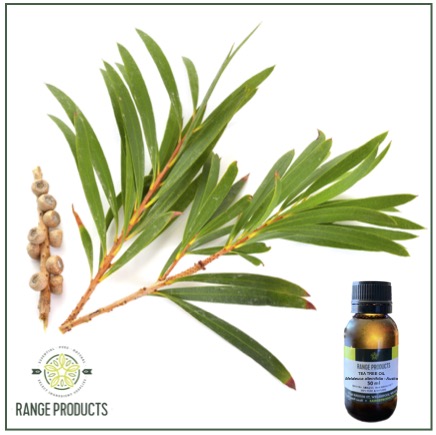
Tea tree essential oil has analgesic, antibacterial, antimicrobial, antiviral, balsamic, cicatrizant, expectorant, fungicide, insecticide, stimulant and sudorific properties. The main chemical compounds are terpinen-4-ol, gamma-terpinene, and alpha-terpinene.
- Skin Care: Treats acne, athlete's foot, dandruff, wounds
- Oral Health: Fights mouth infections, gingivitis, plaque
- Immune System: Boosts immunity against colds and flu
- Respiratory System: Relieves congestion, coughs, bronchitis
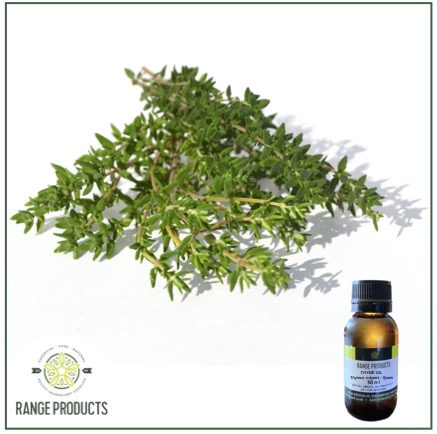
Thyme essential oil has analgesic, anti-spasmodic, antiseptic, bactericidal, bechic, cardiac, carminative, cicatrizant, diuretic, emenagogue, expectorant, hypertensive, insecticide, stimulant, tonic, and vermifuge properties. The main chemical compounds are thymol, cymene, and linalool.
- Immune System: Boosts immunity against illnesses
- Respiratory System: Loosens phlegm and relieves coughs
- Circulation: Improves blood flow and heart health
- Oral Health: Fights gum disease and oral infections
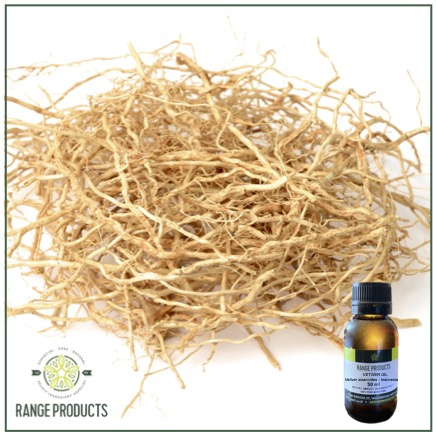
Vetiver essential oil has anti-inflammatory, antiseptic, bactericidal, cicatrizant, nervous system soother, stimulant, tonic, and vulnerary properties. The main chemical components are khusimene, vetivenene, and zizaene.
- Skin Care: Helps wounds, cuts, scars heal faster
- Circulation: Lowers blood pressure and body temperature
- Emotional Health: Alleviates anxiety, anger, stress
- Pain Relief: Reduces arthritis pain and muscle aches
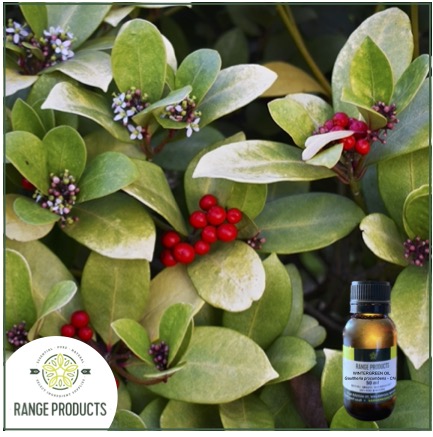
Wintergreen essential oil has analgesic, anesthetic, antirheumatic, antiseptic, aromatic, astringent, carminative, diuretic, emenagogue, stimulating, and warming properties. The main chemical compound is methyl salicylate.
- Pain Relief: Reduces muscle/joint aches, arthritis, gout
- Circulation: Increases blood flow and warmth in tissues
- Oral Health: Relieves toothaches and mouth sores
- Skin Care: Soothes muscle stiffness and cramps when applied
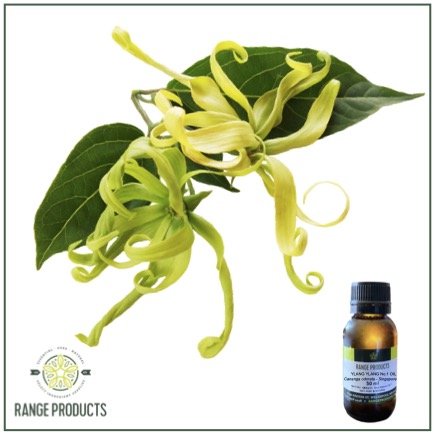
Ylang ylang essential oil has antidepressant, antiseborrhoeic, antiseptic, aphrodisiac, hypotensive, nervine, sedative, and tonic properties. The main chemical components are germacrene D, caryophyllene, p-cresyl methyl ether, methyl benzoate, and benzyl acetate.
- Skin Care: Balances sebum production, hydrates skin
- Emotional Health: Elevates mood, reduces anger, anxiety
- Circulation: Lowers blood pressure and rapid heartbeat
- Nervous System: Relieves insomnia, fatigue, stress
To use essential oils safely, always dilute them with a carrier oil and conduct a patch test before applying fully.
The common side effects of essential oils are skin irritation and allergic reactions.
To choose the right essential oil, opt for ones that are 100% pure and therapeutic-grade from trusted suppliers.
Lavender and chamomile essential oils are generally safe for children over two years old. However, it's essential to dilute the oils and do a patch test before use.
Store essential oils in a cool, dark location, away from direct sunlight to preserve their effectiveness.
Our store is well stocked with a selection of quality essential oils, base products, carrier oils and raw ingredients. Plus, it smells amazing!
Visit us in-store to stock up on materials for your next creation.

6/138 Radium St Welshpool Western Australia 6106Australia
Showroom
9am – 3:30pm
Order pickups available
8am – 4:30pm